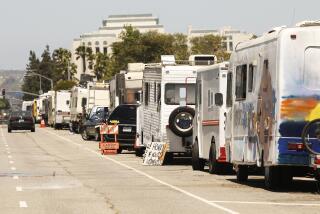Yagman on Federal Agents’ Decisions
- Share via
I read with interest Stephen Yagman’s Sept. 9 commentary on the search warrant executed at the residence of James Beck. Yagman claims the execution of a federal court order endangered an entire neighborhood. Would this be the same position Yagman, a “civil rights attorney,” would take if an innocent neighbor had been injured, had not a law enforcement agency taken some action?
Yagman has filed many suits against law enforcement personnel and has made a living off these suits. If my memory serves me correctly, Yagman’s license to practice law was suspended because it was determined that he had taken a higher-than-allowed percentage of a judgment ordered for his clients as fees.
Yagman also was appointed/volunteered to be a special prosecutor to prosecute the FBI special agent that was charged in the death of Randy Weaver’s wife. Yagman described this event, saying, “The result: the deaths of Weaver’s 14-year-old son and his wife.” I guess he forgot that a deputy U.S. marshal was also killed. He stated that three events (Waco, Ruby Ridge and the Beck warrant) all had the agents “armed with fuzzy and incomplete information.” That’s what makes the job of a federal agent very difficult. We never have all the information, and we don’t have the luxury of second-guessing the decisions at the time the decisions are made.
Yagman’s opportunity to express his view, though misguided and self-supporting, is what makes this country so desirable to many throughout the world. Even though I vehemently disagree with his view of the events, I will defend his right to make those comments. But I question where his credibility originates, and why he was given such a forum to air his opinion.
Steve Walsh
U.S. Treasury Agent
Los Angeles
*
Yagman appears correct in his assessment of the ATF’s actions against Beck, at least in hindsight. But what explains the ATF’s lack of patience in this case? Any investigation should examine the role played by Beck’s neighbors, who engaged in an organized effort to develop and provide evidence that would lead to the type of confrontation that occurred. This effort included surveillance of Beck’s home, including binocular surveillance. What pressure or influence did these people also bring to bear on law enforcement to act?
One can’t help but get the feeling that Beck was in some respects the target of bored and nosy neighbors. Although nothing excuses Beck’s conduct, it needs to be determined whether the urgings of these meddlers in any way influenced the manner in which the ATF approached this particular problem.
John Landry
Santa Monica
More to Read
Sign up for Essential California
The most important California stories and recommendations in your inbox every morning.
You may occasionally receive promotional content from the Los Angeles Times.













